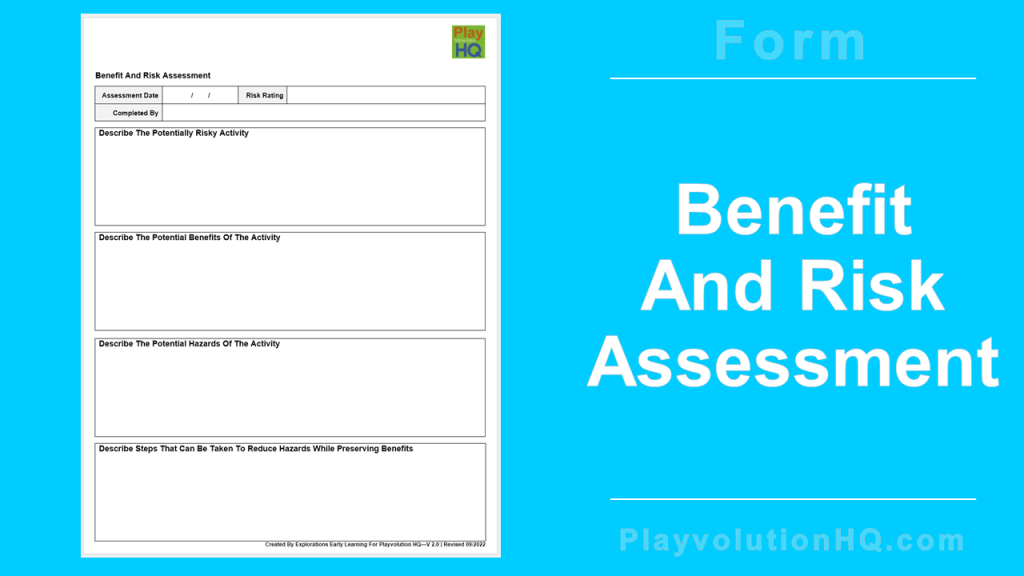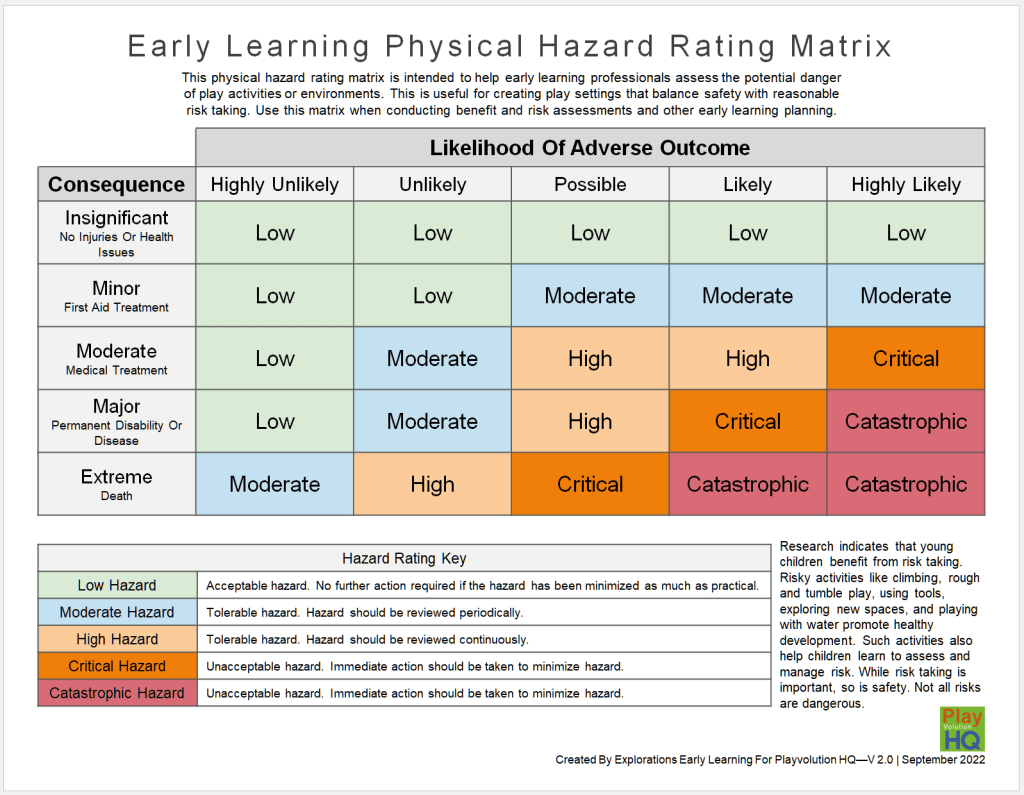
Overview
Use this free Benefit And Risk Assessment to assess the riskiness of early learning activities and play spaces and manage potential hazards. This assessment helps you think through activities and keep them as safe as possible for the children involved. The Benefit And Risk Assessment also serves as documentation that you’ve put some thought into the activity–this is useful if coworkers, parents, or administrators voice concern over an activity.
Using The Benefit And Risk Assessment Form
Start by filling in the date and name of the person completing the assessment.
Description
In the Benefit And Risk Assessment’s first big box, describe the potentially risky activity. Provide enough detail to create a clear picture of the activity. For example, “preschoolers roasting hot dogs over a fire pit” is not as clear as “3-4 preschoolers at a time will be allowed to roast hot dogs over the fire pit with staff supervision. Before roasting the dogs, kids will have a chance to spend time around the fire with the staff member and ask questions. They will also receive some direct instruction about how to be safe near fire.”
Rating
Now, determine the activity’s Risk Rating using the Early Learning Physical Hazard Rating Matrix. To do this, determine what the likelihood of an adverse outcome is for the activity you are considering based on the likely consequence. For example, roasting hot dogs in small well-supervised groups is Highly Unlikely to have any adverse effects, and any consequence would be minimal. The chances of anything worse than a Minor consequence requiring first aid is very unlikely.
Add your Risk Rating to the top of the assessment.

Benefits
In the next box, list the activities benefits. For example, hot dog roasting benefits include:
- Understanding of and respect for fire
- Confidence and situational awareness
- Sensory integration
- Understanding of how heat cooks food
- Language development
- Social development
Make the list as thorough as possible.
Hazards
In the third big box on the assessment, list all the potential hazards associated with the activity that you can think of. Hazards are dangers a child can not easily see or predict. For example, sticks or other obstacles on the ground around the fire pit are hazards since children will likely be focused on the fire more than the placement of their feet.
The way kids handle their roasting sticks is another potential hazard. They may end up paying so much attention to the flicker of the flames that they lose track of where their stick is pointing. The fire in our ongoing hot dog roasting example is not really a hazard, since all the kids will be paying it lots of attention.
Spend some time on this one and suss out as many potential hazards as you can. They are elusive–that’s what makes them dangerous. Your job here is to anticipate them, so you can avoid them during the activity.
Reduction
Speaking of avoiding hazards, that’s the goal in the final big box on the Benefit And Risk Assessment. Your job here is to list steps that can be taken to reduce the hazards while preserving the benefits. For example, to address the two hazards mentioned above, you could:
- Clearing any ground clutter from around the fire pit
- Remind the children to pay attention to their feet before you begin and during the activity
- Avoid using sticks that are too long since they would be more likely to poke or trip another child
- Spend a few moments discussing stick etiquette with the kids before approaching the fire
- Give Stick Alerts if you notice anyone getting careless with their stick during the activity
Here’s The Free Benefit And Risk Assessment Form
Download it, print it, and use it to help keep everyone in your setting safe and healthy:
Here’s a link to an episode of the Child Care Bar And Grill podcast where we discuss this form.
Related Posts
More posts related to early learning program operations at the links:


Contribute content to Playvolution HQ
Brought to you by Explorations Early Learning
Post Author
Jeff Johnson is an early learning trainer, podcaster, and author who founded Explorations Early Learning, Playvolution HQ, and Play Haven.

Leave a Reply